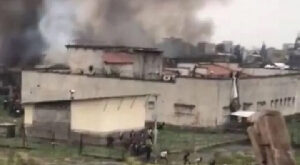Burkina Faso’s former President Blaise Compaore, sentenced in absentia to life in jail for the 1987 assassination of revolutionary icon Thomas Sankara, has apologised to the ex-leader’s family.
“I ask the Burkinabe people for forgiveness for all the acts I may have committed during my tenure, and especially the family of my brother and friend Thomas Sankara,” he said in a message read out by government spokesman Lionel Bilgo on Tuesday.
Compaore seized power in the West African nation in a 1987 coup that toppled and killed serving leader Sankara. In April, a Burkina court handed him a life term in absentia for his role in the assassination.
“I take responsibility for, and regret from the bottom of my heart, all the suffering and tragedies experienced by all victims during my terms as leader of the country and ask their families to grant me their forgiveness,” he added.
Compaore, 71, has been living in exile in neighbouring Ivory Coast since being removed from power by mass protests in 2014.
He returned to Burkina Faso for several days this month, without facing arrest, after the country’s military leader Lieutenant Colonel Paul-Henri Sandaogo Damiba invited him in the name of “national reconciliation”. The visit sparked an outcry among civil society groups and political parties, who said uniting the nation should not come at the expense of impunity.
Compaore expressed his “deep gratitude” to Burkina Faso’s military-dominated transitional government. He called on his compatriots to join “a sacred union, tolerance, moderation, but above all forgiveness so that the national interest prevails”.
A fiery Marxist-Leninist who blasted the West for neo-colonialism and hypocrisy, Sankara was gunned down by a hit squad on October 15, 1987, little more than four years after coming to power as an army captain aged just 33.
Damiba took power in a January coup that deposed former President Roch Marc Christian Kabore, amid widespread anger at the government’s failure to deal with a bloody rebellion that spread from neighbouring Mali in 2015.
 Home Of Ghana News Ghana News, Entertainment And More
Home Of Ghana News Ghana News, Entertainment And More





